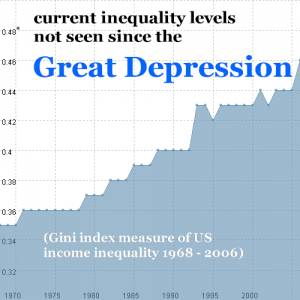Sharing the Wealth is Good for Everybody
January 2, 2009 by Openyear
Filed under Sharing Economy
During the 2008 Presidential campaign Barack Obama spoke with a plumber named Joe in Ohio about his tax plan. Here’s how it went.
Obama points out to Joe the plumber that “spreading the wealth around is good for everybody”.
Why did he say this? Perhaps, he is familiar with the history of the Great Depression. Mariner S. Eccles, FDR’s Fed Chariman from 1931-34 concluded in his book, Beckoning Frontiers: Public and Personal Recollections, that inequality was the main cause of the Depression. Mariner put it as follows:
 “A giant suction pump had by 1929-30 drawn into a few hands an increasing portion of currently produced wealth.”
“A giant suction pump had by 1929-30 drawn into a few hands an increasing portion of currently produced wealth.”
“The United States economy is like a poker game where the chips have become concentrated in fewer and fewer hands, and where the other fellows can stay in the game only by borrowing. When their credit runs out the game will stop.â€
In other words, if earning is not well distributed, the economy stalls, because people lack the purchasing power to keep it going.
Inequality has also been shown to shorten life expectancy for those in the bottom 80%, with the difference between super earners and earners amounting to about 2 years on average. While it may not seem like much, this is equal to the gain in life expectancy society would receive if cancer were cured, as Larry Summers explains below:
Obama’s rival John Mccain later responded in a radio address with:
“As Joe the Plumber has now reminded us all, America didn’t become the greatest nation on earth by letting government “spread the wealth around.” In this country, we believe in spreading opportunity.”
Both McCain and Obama are right. But, it begs the question, Why isn’t opportunity itself spreading the wealth as well as it once did?
Like global warming, the root cause comes down to the economy not fully accounting for the consequences of what we do. In the case of global warming, the harm that invisible carbon gases do has remained economically invisible, because we’ve failed to price it. Out of price. Out of mind.
As essential as carbon is to life, influence is just as essential to work life. Like carbon gas, influence is economically invisible.
Skill or know how, is visible in the form of diplomas, degrees and resumes. So, salaries tend to be set by visibles, like skill scarcity. But, know how is only half of how we earn. There’s also know who, know what, know when and know where passing between people, or influence.
Because skill is embodied in a single person, it is atomic and individuated. By extension, closed pay approaches based on skill , exclude others, are 1-way and tend to concentrate more money in fewer hands. In contrast to skill, influence is social evidence that no one does it all alone. By extension, open pay approaches based on influence include others, are multi-way and distributive, and place more money in more hands.
In the same way that governments do not expect to solve the problem of global warming alone, but instead rely on companies pioneering green technologies, neither can governments solve the problem of inequality alone. Like global warming, it’s too big.
But, together we can reduce it, by choosing to, open our pay to one another. With your permission, Openyear can help to make influences between us visible, so that how we’re paid better reflects what we do
with the opportunities we get.


